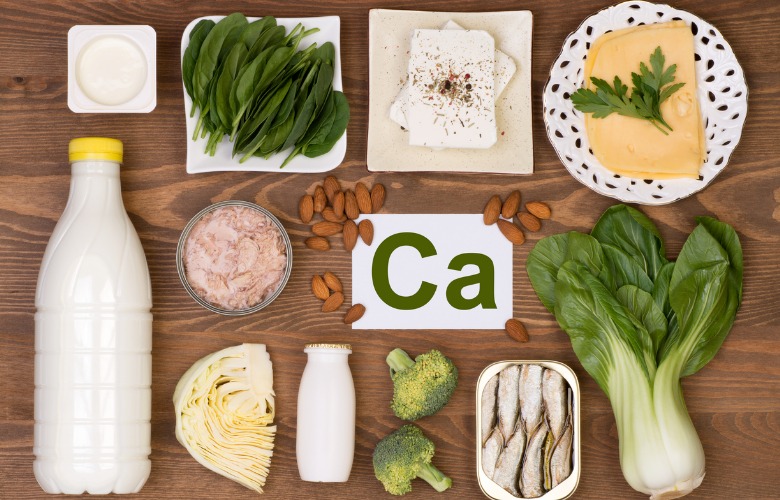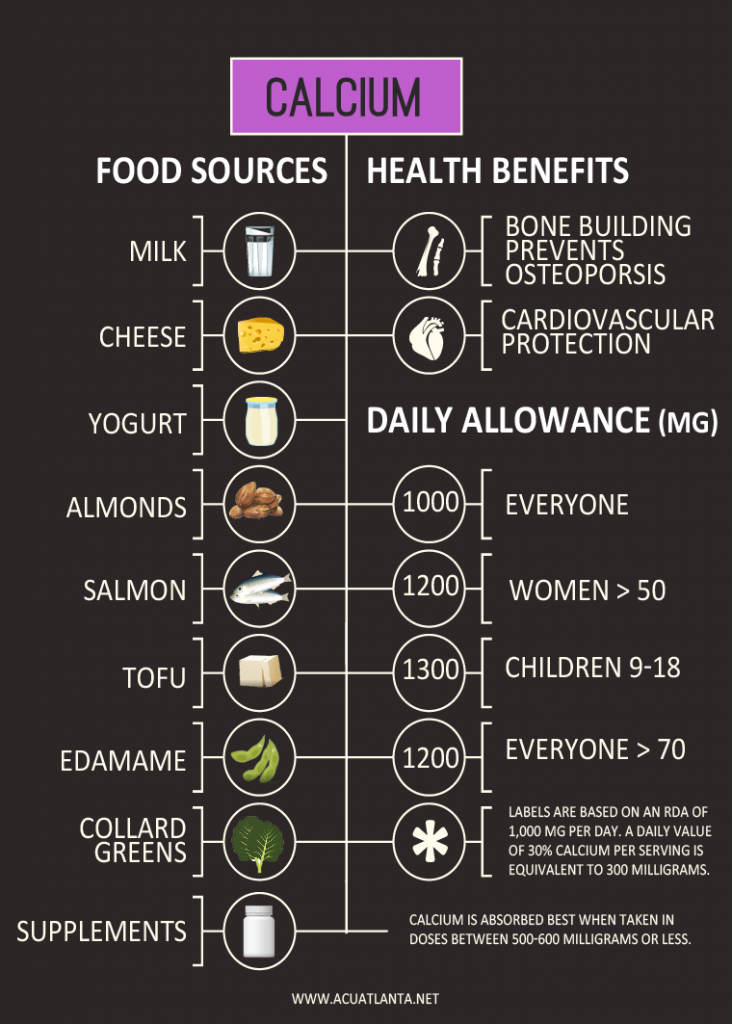Benefits of Calcium
That is because calcium is an essential mineral at all life stages, from childhood through the senior years. Most people know that calcium is an essential nutrient to promote healthy bones and teeth; too little of this mineral leads to bone loss as we age because if we’re not getting enough calcium, the body takes it from our bones. This can increase the risk of osteoporosis and bone fractures.
But before you down a few extra glasses of milk per day or toss back calcium supplements, it is important to understand the basic facts of this all-important nutrient.
WHY CALCIUM
For bone building, calcium is a powerhouse superstar. Bones and teeth need to be taken care of throughout your lifetime, but more than that calcium also helps our blood to clot.
As people age, bone loss, resulting in osteoporosis, becomes a concern. Osteoporosis is the lack of bone density and can make someone more susceptible to fractures and bone breakage. Thus, many people over the age of 60, particularly women, take calcium supplements as a preventative measure; this age group is particularly susceptible to osteoporosis because of a decline in estrogen following menopause.
Besides osteoporosis, a true calcium deficiency may manifest in muscle cramps, abnormal heart rhythm, and numbness in fingers and toes.
HOW MUCH CALCIUM
Calcium is not something we store in our bodies with plenty of reserves for the next day. Calcium is lost on a daily basis and must be replenished each day with food sources and, if needed, supplementation.
According to federal guidelines, the recommended daily intake (RDA) of calcium is 1000 milligrams (mg) per day for adults. Women over 50, however, should aim for 1200 mg daily, as should everyone over 70; for children between the ages of 9-18, it is recommended that they consume 1300 mg each day. Pregnant or lactating women over the age of 19 should strive for 1000 mg per day.
It is a fallacy that men do not need calcium, though their requirements are somewhat less than their female counterparts. Still, men should aim to get their calcium through food and not supplements, unless otherwise directed by a physician.
SOURCES OF CALCIUM
When you envision calcium-rich foods, do you automatically think of dairy products? While it is true that calcium is found in abundance in milk, cheese, yogurt, and the like, there are plenty of other food sources in which calcium is present. You might be surprised to learn that seeds, such as chia, poppy, and sesame, are calcium superstars, as are almonds. Other good sources are sardines and canned salmon, as well as tofu, white beans, and edamame.
Alternative sources of calcium are indeed good news for those who are lactose intolerant or who are not gaga over dairy. For those who do love dairy, it might be prudent to choose lower-fat versions of these products. It may not be worth the intake of excessive saturated fat grams just to get your daily calcium intake: Skim milk has just as much calcium as whole milk (about 300 mg per cup), while nonfat yogurts often have even more calcium than the full-fat variety. As for cheese sources, those with the highest calcium content include the harder cheeses: Parmesan, cheddar, and Gruyere. About one ounce of Parmesan cheese offers about 1/3 of the RDA of calcium, a good excuse if any to be generous shaking some over your next bowl of spaghetti.
Would you be surprised to learn that certain vegetables provide excellent sources of calcium? For vegetable lovers, that is good news indeed.
Perhaps the vegetable that carries the most calcium punch is collard greens—one cup, cooked, offers a whopping 266 milligrams. Runners up are kale, at 94 milligrams per one cooked cup, baked butternut squash, at 84 milligrams per cup, and baked sweet potato, which provides 76 milligrams of calcium per cup. Other vegetables containing worthwhile amounts of calcium include broccoli, Brussels sprouts, carrots, and cauliflower.
Okra, cress, and rhubarb are other calcium-containing vegetables. As for fruits, the highest concentration of calcium can be found in figs, oranges, and currants.
Other foods are sometimes fortified with calcium, such as select orange juice, soy drinks, some hot chocolate, and certain cereal brands.
To ensure that you’re getting enough calcium through food sources, learn to correctly read labels on packaged foods. The labels are based on 1,000 milligrams of calcium per day. For example, a packaged food that indicates a DV (daily value) of 30% calcium per serving is equivalent to 300 milligrams of calcium.
To track if you’re getting enough calcium in your diet, based on your gender, age range, or if you’re pregnant, it couldn’t hurt to keep a food diary. You may be surprised by how much—or how little—of this essential nutrient shows up in your diet.
CALCIUM SUPPLEMENTATION/PRECAUTIONS
For some people, getting enough calcium through food sources can be a challenge, particularly for those who shun dairy products, or who are not big on fruits or vegetables. In those cases, some people turn to calcium supplementation. A variety of calcium supplements can be found in natural food and vitamin stores, ranging from flavorful chewables to pills that can be swallowed. Some people even take regular antacids to get their calcium intake, as they contain calcium carbonate.
Before you start yourself on regular calcium supplements, however, it is wise to check with your practitioner to ascertain if you need it, how much you need, and when to take it. That is because, although calcium is a necessary mineral, one that provides crucial structural support for bones, too much can be harmful.
A 2016 study conducted at Johns Hopkins found that calcium supplements might cause plaque buildup in arteries, potentially leading to heart damage; conversely, a calcium-rich diet appears to provide some cardiovascular protection. The researchers concluded that the people can eat calcium-rich foods as part of a healthy diet but should check with their physicians before adding a calcium supplement to their regimen.
Similarly, a 2013 study assessed the health of 400,000 men over a course of 12 years. Men who took 1000 mg of calcium on a daily basis were 20% more likely to die from heart disease than those who did not, according to evidence presented by the NIH-AARP Diet and Health Study. Similar findings were not present in women.
Too much calcium in supplement form can also increase the risk of kidney stones, but as is true with the risk of plaque build-up, dietary forms of calcium do not increase the risk.
A new study cleared calcium, either in supplemental form or a food source, as being a culprit in increasing risk for macular degeneration.
An abundance of calcium may also lead to constipation as well as prevent your body from absorbing iron and zinc, and they may interfere or interact with certain medications.
Thus, (and this is true of most other essential nutrients), you should try to get the bulk of your calcium from food sources. If you do opt for calcium supplements, though, they should be taken with food for best absorption rates. Also, check with your doctor or pharmacist if any calcium supplements would interact with other over-the-counter or prescription medications. And if you already take a daily vitamin, read the label to ascertain how many milligrams of calcium is already present in your vitamin.
Finally, it is worth noting that calcium is absorbed best when taken in smaller doses (e.g., between 500-600 milligrams or less), at different times of the day, and that applies to calcium that derives from both food and supplements.
References
1 https://ods.od.nih.gov/factsheets/Calcium-HealthProfessional/
2 https://www.pcrm.org/health/diets/vsk/vegetarian-starter-kit-calcium
3 https://www.iofbonehealth.org/osteoporosis-musculoskeletal-disorders/osteoporosis/prevention/calcium/calcium-content-common-foods
4 https://www.nof.org/patients/treatment/calciumvitamin-d/
5 https://www.sciencedaily.com/releases/2016/10/161011182621.htm
6 https://www.health.harvard.edu/blog/high-calcium-intake-from-supplements-linked-to-heart-disease-in-men-201302065861
7 https://www.sciencedaily.com/releases/2019/03/190321141912.htm
8 https://www.nof.org/patients/treatment/calciumvitamin-d/

Hilary Daninhirsch is a Pittsburgh-based freelance writer. A former lawyer, she lives with her husband, two redheaded teenage daughters, and a needy terrier. When she’s not writing, she’s probably reading or cheering on one of her daughters at a gymnastics meet or on a stage. Hilary’s online portfolio can be viewed at hilarydaninhirsch.journoportfolio.com




